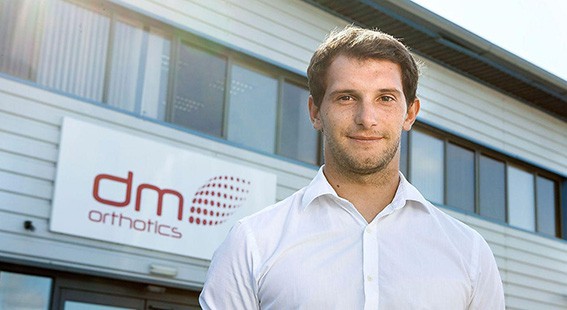
Published: 18th January 2018

Published: 18th January 2018
Over the last five years, the University of Plymouth has helped South West businesses access approximately £2million of investment for Knowledge Transfer Partnership (KTP). This UK-wide programme has been helping businesses tap into the wealth of knowledge, skills and technology in universities for the last 40 years.
Dave Marshall, Specialist KTP Advisor for the University, explains: “When a business contacts us about a KTP, it’s generally because they’ve got a problem they can’t solve on their own. The aim of KTPs is to bring universities and local businesses together to deliver a strategically important project, resulting in an innovative new product or process, giving the company a significant return on their investment.”
The average KTP costs £75,000 per year, with SMEs generally contributing approximately £25,000. This includes paying a KTP Associate, a graduate who works in the business for a set period of time and is jointly recruited and managed by the business and the University. According to Innovate UK, every pound invested in KTP typically yields a six to seven-fold return on investment.
Internationally-renowned creator of medical rehabilitation and sports performance products DM Orthotics has recently completed its fourth KTP with the University of Plymouth. This is helping the Redruth-based company develop a number of products to support people with a range of medical conditions, including a sports sock for runners and gymnasts who have plantar fasciitis.
DM Orthotics Managing Director Martin Matthews says: “Everything we market is evidence based but as an SME we simply can’t afford to do full blown research. Without a KTP, it would take us another ten years to get the evidence we need. KTPs have been instrumental in us having that evidence base and have enabled DM Orthotics to punch above its weight.”
Saltash firm Spinnaker is a world leader in security products for the cash in transit industry and has completed several KTPs with the University of Plymouth. The latest resulted in the firm creating valuable IP for a new bank note scanning system, replacing labour-intensive processes that are currently used by banks.
Research and Design Manager Nick Tripp said: “Our latest KTP with the University of Plymouth has allowed us to branch out in our product portfolio, giving Spinnaker a new product strand. We now have exclusive IP that we’re licensing internationally. A KTP allows us to cost effectively research new technology and ideas with support from the University. It also gives us someone dedicated to that one area of research – something we would not be able to do on our own.”
Tips for running a successful KTP:
“Having a clear idea of the end game is essential. You need to start the process with a key question you want answered. It also needs to be a question that hasn’t been covered before,” advises Martin Matthews.
“You’ll only get good results if you actively manage your KTP Associate,” says Nick Tripp. “Be prepared to give time to that person and have an open door so they can talk to you,” adds Martin Matthews.
“Be clear on what you want to achieve, but don’t be afraid to explore other opportunities as they arise to maximise benefits and deliver beyond the scope of the initial project,” advises Dave Marshall.
“There are some quick benefits to doing a KTP, such as discovering what else is on the market, but research findings can take time to deliver commercial results,” says Martin Matthews.
“As the KTP progresses, you can identify other areas of collaboration that will both complement your KTP, and support you over the longer term. The University supports businesses in all sorts of other ways and we are interested in forging ongoing relationships,” says Dave Marshall.